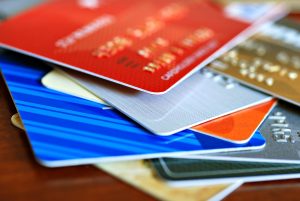What to Look for When Applying for a Credit Card

Credit cards rarely go out of style. On average, Americans have three credit cards. And, with offerings of 0 percent interest promotions, inexpensive balance transfers, cash rewards, and other benefits, it may be a good time to apply for a new card.
But what do you look for when applying for a credit card?
Not all credit card offers are good ones, and there are things you will want to know before applying. Below, we will evaluate what to look for when applying for a credit card.
APR vs. Interest Rate
Even if you plan to pay off your credit card each month so you don’t incur interest charges, it’s a good idea to look for cards with lower interest rates.
The terms APR and interest rate are often used interchangeably, but they have distinct meanings.
The interest rate is fairly straightforward—it’s the rate of interest assessed on the credit card balance.
The annual percentage rate (APR) is an annualized representation of the interest rate (even though credit cards compound interest daily). This rate can also include other factors such as fees.
Credit cards generally have several APRs:
- Purchase APR applies to all your credit card purchases.
- Balance transfer APR applies to any balances that are transferred from another card onto your new credit card. Some balance transfer APRs are kept low for promotional reasons, though some may be higher than a card’s purchase APR.
- Penalty APR applies to any delinquent balance on the card. The penalty APR is usually capped at the federal maximum of 29.90 percent.
- Cash advance APR applies to credit you use to get a cash advance at a bank or ATM.
APRs can be either fixed or variable. Most credit cards have variable APRs, which means the APR may go up or down based on your credit card utilization, payment history, credit score, changes in the federal prime interest rate, and other factors. Since the rate change may happen with little to no notice, it’s prudent to stay on top of APRs.
Annual Fee
Some credit cards—particularly those geared toward business owners, travelers, or high spenders—carry an annual fee. Though you don’t need to pay a fee to get a high-quality credit card, there are some situations in which doing so may make sense.
Credit cards that carry an annual fee often offer elevated benefits—more cash back, frequent flyer miles, hotel points, or access to certain services. In some cases, the value of these benefits can significantly exceed the cost of the annual fee. But if the benefits aren’t something you’d normally use, it may make more sense to go for a fee-free card.
Fraud Protection
Credit card fraud should be a concern for any credit cardholder. When choosing a new card, it’s important that it has thorough fraud protection that will keep you covered if your card is lost, stolen, or hacked.
Some credit cards also offer supplemental fraud protection, giving you coverage for any losses associated with non-credit-card-related identity theft. If you’ve fallen victim to a data leak or have had identity theft problems in the past, it can be worthwhile to get this additional coverage to protect against any future incidents.
Balance Transfer Fees
Many credit cards offer introductory 0 percent balance transfers. Transferring another card’s balance to a new card can be a great way to pay off higher-interest debt; however, not all balance transfers are created equal. ‘
Most credit cards assess a modest balance transfer fee, so consider whether you’ll be able to pay off the total balance before the card begins charging interest. If you won’t be able to pay off the balance, you may end up paying more interest than if you left the balance on your original card.
Reward Rates and Structure
Credit cards can be a great source of extra cash for those who participate in rewards programs (as long as you’re not paying interest on any balances). But there’s no one-size-fits-all card—the right card for you will depend on your usage and top spending categories.
For example, if you’re on the road a lot, a gas rewards card can help you save at the pump. If you love free vacations, a travel rewards card can give you free hotel stays, discounted flights, or access to the business-class lounge. The list goes on.
But look at the fine print. Many of the cards that offer higher cash-back promotions will cap the total reward at a certain dollar amount. You could be better off with a card that earns a slightly higher flat rate on all transactions, regardless of category.
One major benefit of these types of credit card perks is that they’re usually tax-free. Cash back rewards are considered a type of discount, rather than a cash payment (even when benefits are received in cash). But this isn’t always the case. Consider your tax rate and the way the benefits are received before deciding which is the best card for you.
International Accessibility
If you plan to use your card on an overseas trip, you’ll want to make sure it’s accepted at the places you plan to go. Some cards don’t have much of an international network (or charge fees for international use), while others are specifically designed to be used internationally.
Understanding What to Look for When Applying for a Credit Card
Credit cards can be a great tool in your financial toolbox. However, the right card can depend on a range of factors.
Partners Financial Federal Credit offers its members helpful advice, including guidance on how to choose what type of credit card is best for you. Click below to learn about our Visa credit card options and the great features and benefits of each.

 Member Resources
Member Resources News & Information
News & Information Privacy Policy
Privacy Policy Fees
Fees Branch Holiday Schedule
Branch Holiday Schedule
